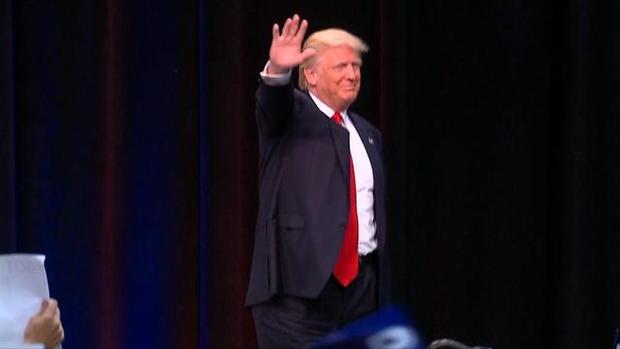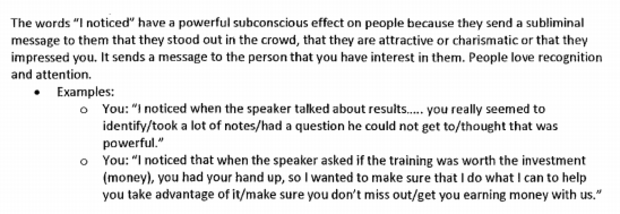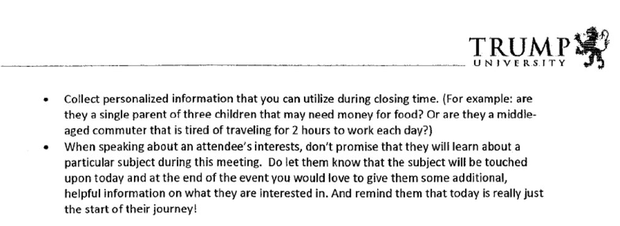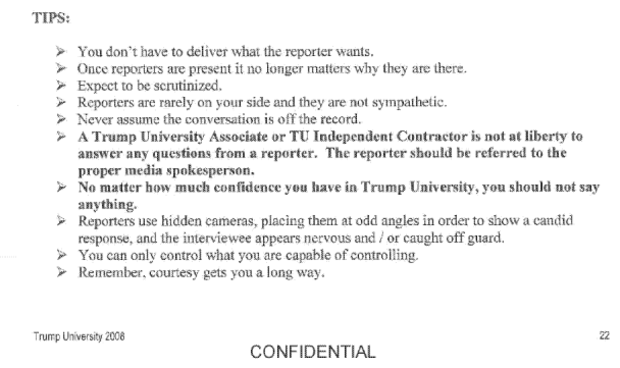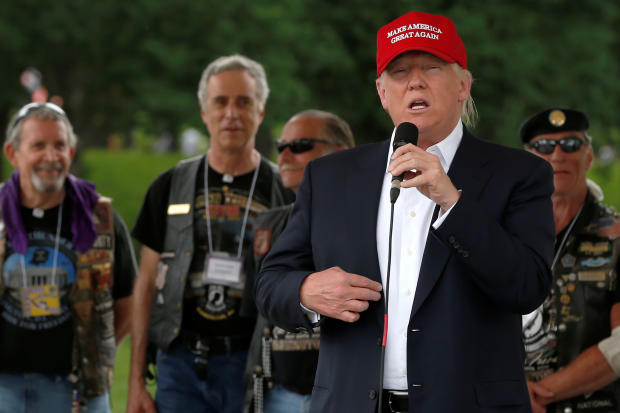7 things that stand out in the Trump University documents
Nearly 400 pages of documents and "playbooks" from Trump University, the now-defunct series of real estate seminars started by presumptive GOP nominee Donald Trump, were unsealed Tuesday.
The documents show how staffers for Trump University sold the expensive program to potential students, even those with financial limitations such as credit card debt or expenses related to children. They were unsealed as part of a lawsuit against Trump University brought by former customers saying they were defrauded by the school.
On Wednesday, the judge in the case ordered some of the documents resealed because some records had been released by mistake.
Democratic front-runner Hillary Clinton and her campaign have sharply criticized Trump over the issue, with Clinton saying in New Jersey Wednesday that the program indicates Trump is "a fraud. "Donald Trump enriched himself at the expense of hard working people," Clinton said, calling Trump University "just more evidence that Donald Trump himself is a fraud."
The Trump campaign released this video, featuring three Trump University students who defended the courses:
A Trump spokesperson responded Wednesday, saying the evidence in the case "demonstrates the high level of satisfaction from students."
"The Court's order unsealing documents has no bearing on the merits of Trump University's case," the statement reads. "Much of the unsealed evidence, including declarations and surveys from former Trump University students, demonstrates the high level of satisfaction from students and that Trump University taught valuable real estate information. Trump University looks forward to using this evidence, along with much more, to win when the case is brought before a jury."
Read on to see seven highlights from the documents.
No Money? No Problem.
The "playbooks" suggest that lack of funds shouldn't deter students from attending Trump University.
In one section, the guide suggests encouraging prospective students to put the tuition--which could be tens of thousands of dollars, depending on the program--on their credit cards.
"What most people do is handle the tuition by putting it on their credit cards because it gives them the ability to make very small monthly payments and maintain a low overhead to run their real estate project," it reads. "Then we tell them to use their success in real estate to pay off the banks in a couple of months or so."
"Roller Coaster of Emotions"
The Trump University "playbooks" were very concerned with the "psychology" of selling its real estate seminars to potential customers.
In one section, staffers are encouraged to take clients on "the Roller Coaster of emotions."
"This sales process is based on managing the emotions of the client by focusing on the psychology of the sale," it reads.
Don't Act Impressed
One section urged staffers not to appear "impressed" by potential students.
"When attendees see that we (the experts) are impressed by their accomplishments, they may easily leave thinking that they don't need our help," the guide says.
"I Noticed"
...And then in another section, the Trump University documents suggest recruiters should consciously praise students by using the words "I noticed."
"The words 'I noticed' have a powerful subconscious effect on people because they send a subliminal message to them that they stood out in the crowd, that they are attractive or charismatic or that they impressed you," the guide says. "It sends a message to the person that you have interest in them."
Single Moms
One section of the "playbooks" urge sales representatives to "collect personalized information" about potential clients to close the deal.
"For example: are they a single parent of three children that may need money for food?" the guide reads. "Or are they a middle-aged commuter that is tired of traveling for 2 hours to work each day?"
"Think vs FEEL"
In part of the playbook on sales tools is a sub-section called "Think vs. FEEL."
"Don't ask people what they THINK about something you've said. Instead, always ask them how they FEEL about it," the section instructs staffers. "People buy emotionally and justify it logically. "'How do you feel about that?'"
The sentiment is put another way in a section on sales tools is "Sales Wisdoms," which shares this insight with its staffers -- "You don't sell products, benefits or solutions--you sell feelings."
No Reporters Allowed
Given Trump's recent tussles with the media, including his particularly combative press conference on veterans' donations Tuesday, it's no surprise that the Trump University documents include tips for dealing with the media.
"Reporters are rarely on your side and they are not sympathetic," the document reads. "...Reporters use hidden cameras, placing them at odd angles in order to show a candid response, and the interviewee appears nervous and/or caught off guard."
It encourages staffers to stay quiet in all circumstances: "No matter how much confidence you have in Trump University, you should not say anything," it reads.
Criticism of Trump U judge
Speaking at a rally in San Diego last week after news broke that U.S. District Court Judge Gonzalo Curiel ordered the documents to be unsealed, Trump called the judge a "hater" and noted his ethnicity.
"The trial is going to take place sometime in November. There should be no trial," he said. "This should have been dismissed on summary judgment easily, everybody says it. But I have judge who is a hater of Donald Trump, a hater. He's a hater."
Trump insisted, as he had in the past, that he doesn't "settle" cases when he believes he's in the right.
"I could have settled this case many times, but I don't want to settle cases when we are right. I don't believe in it. And when you start settling cases, you know what happens? Everybody sues you because you get known as settler. One thing about me, I am not known as a settler," Trump said.
He added: "The judge, who happens to be, we believe, Mexican, which is great. I think that's fine."
